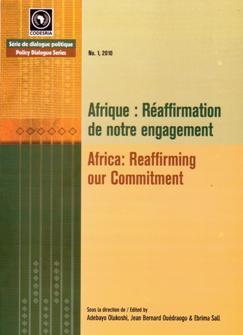Africa: Reaffirming Our Commitment
Mots-clés :
Reaffirmation, Engagement, VIH/SIDA, NEPADSynopsis
The CODESRIA Policy Dialogue Series has been designed as a means of addressing the main challenges facing the African continent. Africa: Reaffirming our Commitment is designed to examine the economic foundations of our states and the question of the dignity of Africans as human beings. We are operating under a ferocious globalisation where the rules of engagement are based on economic and military supremacy, fields in which Africa still lags behind. The objective of this book is not to lament or finger-point those who caused Africa’s ills, but rather to think of means and propose strategies that can be used to free ourselves from poverty and oppression, and most importantly, identify the main drivers that could accelerate Africa’s development. This publication proffers ways by which our economy and our governments can be put at the service of all Africans. It proposes ways towards the establishment of pacific, harmonious, just and equitable societies in an Africa where local and pan-African citizenship will be a reality. It also advocates the establishment of collective identities and inclusive societies informed by a redefined vision of our future generated through a new education and mode of socialisation through schools and other national institutions.
Chapitres
-
Prelim
-
Un projet pour l’Afrique de demain
-
A Project for the Africa of Tomorrow
-
Pour une nouvelle pensée politique
-
De la responsabilité des élites
-
Making Governance Work for All Africans: Responsibility of Ordinary Citizens
-
Philosopher pour une Afrique nouvelle : pour une éducation à la société ouverte en Afrique
-
An Entente for Progress between Knowledge and Power: The Challenges of African Intellectual Development
-
Facing the Challenges of Renewal: The Boundary Perspective on History and Culture
-
Philosophie de l’ajustement structurel, la part de l’idéologie
Téléchargements
Références
Amin, Samir, 1993, Mondialisation et accumulation, FTM/L’Harmattan, Paris.
Amin, Samir, 1995, La Gestion capitaliste de la crise. Le cinquantième anniversaire des institutions de Bretton-Woods, FTM/L’Harmattan.
Amin, Samir, 2003, « Le virus libéral. La guerre permanente et l’américanisation du monde », Le temps de cerises.
Balibar, Étienne, 2002, Droit de cité, Paris, PUF/Quadrige.
Braudel, Fernand, 1985, La dynamique du capitalisme, Paris, Les Éditions Arthaud.
Caroll, James, 2005, « La vérité sort de l’oeil du cyclone », in Courrier international, n° 775, 8-14 septembre, p. 36.
Cicéron, De la Répubique (suivi Des Lois), Flammarion.
Dionne (sous la direction de), La Vie associative, ça marche! Le renouveau de la société civile aux Etats-Unis.
Foucault, Michel, 2001, L’herméneutique du sujet, Paris, Seuil/Gallimard.
Foucault, Michel, 1964, Histoire de la sexualité. III. Le souci de soi, Paris, Gallimard.
Gilder, Georges, 1981, Richesse et pauvreté, Paris, Albin Michel.
Grégoire, L’Abbé, 1991, De la littérature des nègres ou recherches sur leurs facultés intellectuelles, leurs qualités morales et leur littérature, Paris, Perrin.
Grondin, Gilles, « Qui a gagné au Caire ? », Rapport concernant la conférence sur la population et le développement (du 5 au 13 septembre 1994), Montréal, Campagne Québec-Vie.
Hayek, Friedrich August, 1953, Scientisme et sciences sociales. Essai sur le mauvais usage de la raison, Paris, Librairie Plon.
Hayek, Friedrich August, 1985, La route de la servitude, Paris, Quadrige/PUF.
Hayek, Friedrich August, 1989, Droit, législation et liberté, III. L’ordre politique d’un peuple libre, Paris, PUF.
Huntington, Samuel, 1997, Le choc des civilisations, Paris, Odile Jacob.
James, William, 1968, Le pragmatisme, Paris, Flammarion.
Lénine, 1967, L’Impérialisme, stade suprême du capitalisme, Moscou, Éditions du Progrès.
Lyotard, Jean-François, 1979, La Condition postmoderne. Rapport sur le savoir, Paris, Éditions de Minuit.
Maldonado, C.E., 1997, « Human Rights Solidarity and Subsidiarity. Essays Toward a Social Ontology », Washing-ton D.C., Cultural Heritage and Contemporary Change, Series V, Latin America, Volume V, The Council for Research in Values and Philosophy.
Mbembé, Achille, 2000, De la postcolonie. Essai sur l’imagination politique dans l’Afrique contemporaine, Paris, Karthala.
McLean, George F., 1994, « Tradition, Harmony and Transcendence », Cultural Heritage and Contemporary Life, Series III, Asia, Vol. 4, Washington, The Council for Research in Values and Philosophy.
McLean, George F., 1997, (Edited by), Civil Society and Social Reconstruction, Cultural Heritage and Contemporary Change, Series I, Vol. 16, Washington D.C., The Council for Research in Values and Philosophy.
Morrisson, Christian, 1996, « La faisabilité politique de l’ajustement », Centre de développement de l’OCDE, Cahier de politique économique, n° 12.
Nietzsche. Fr., 1985, Le crépuscule des idoles, traduit par Henri Albert, Paris, Garnier-Flammarion.
Reich, Robert, 1993, « L’économie mondialisée », Paris, Nouveaux Horizons.
Rousseau, 1992, Du contrat social, Paris, Flammarion.
Salamé, Ghassam, 1996, « La recomposition du monde. Les rapports nord-sud après la Guerre froide » (Entretien avec), Esprit, n° 226.
Sauvy, Alfred, La population, Paris, Puf.
Savas, E. S., 2000, « Privatisation et partenariats public-privé », Nouveau Horizons.
Toussaint, Eric, 1998, La Bourse ou la vie. La finance contre les peuples, CADTM/ Luc Pire.
Towa, Marcien, 1971, Léopolod Sédar Senghor : Négritude ou servitude ? Yaoundé, CLÉ.
Traoré, Aminata Dramane, 1999, L’Étau, L’Afrique dans un monde sans frontières, Paris, Actes Sud.
Warnier, Jean-Pierre, 1999, La mondialisation de la culture, Paris, La Découverte.
Wolf, Alan, 2005, « L’État, c’est la civilisation », in Courrier international, n° 775, 8-14 septembre






